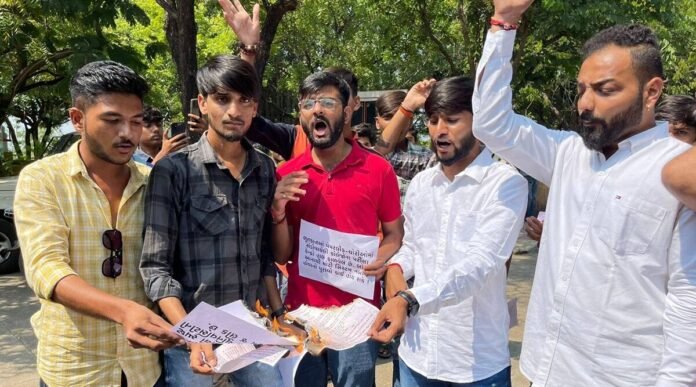In a bid to safeguard the sanctity of Central examinations and ensure fairness in the education system, a significant legislative proposal has emerged, stirring discussions nationwide. The bill, if enacted, would introduce severe penalties—a maximum of 10 years imprisonment and a fine of up to Rs 1 crore—for individuals found guilty of malpractices such as leaking exam papers, facilitating cheating, or tampering with results.
The move comes as a response to the persistent challenge of exam fraud and misconduct that has plagued the Indian education system, undermining the credibility of examinations and compromising the future prospects of millions of students. Instances of paper leaks, question paper tampering, and cheating during examinations have been reported with alarming frequency, exposing vulnerabilities in the existing regulatory framework.
The proposed legislation seeks to address these shortcomings by imposing stringent penalties on those involved in perpetrating exam-related malpractices. By establishing a robust deterrent, it aims to curb the incidence of fraud and uphold the integrity of Central examinations, including prestigious national-level tests such as the Joint Entrance Examination (JEE), the National Eligibility cum Entrance Test (NEET), and the Central Board of Secondary Education (CBSE) board exams.
The severity of the proposed penalties reflects the gravity of the offense and underscores the government’s commitment to combating exam fraud at all levels. A maximum prison sentence of 10 years and a fine of up to Rs 1 crore send a clear message that those who engage in malpractices will face severe consequences, serving as a deterrent to potential wrongdoers.

Critics argue that such harsh penalties may be disproportionate and could potentially deter whistleblowers from coming forward to report instances of exam fraud. Moreover, there are concerns about the practicality of enforcing such stringent measures, given the complexities involved in investigating and prosecuting cases of exam malpractice.
Proponents, however, contend that the proposed legislation is a necessary step towards restoring trust and confidence in the examination system. They argue that the threat of severe penalties is essential to deter unscrupulous individuals and organized syndicates from engaging in fraudulent activities that undermine the integrity of Central examinations.
Furthermore, the bill sends a strong message about the government’s commitment to ensuring a level playing field for all students, regardless of their background or circumstances. By cracking down on exam fraud, it seeks to create a fair and meritocratic system where success is determined by hard work, dedication, and genuine academic achievement.
In addition to imposing penalties on perpetrators of exam fraud, the proposed legislation also includes provisions for strengthening preventive measures and enhancing the security of examination processes. This includes the deployment of advanced technology for question paper setting, printing, and distribution, as well as the implementation of stringent protocols for handling and storing exam materials.

Moreover, the bill emphasizes the importance of raising awareness and fostering a culture of integrity and ethical conduct among students, educators, and other stakeholders. Educational institutions are encouraged to implement measures such as anti-cheating campaigns, integrity pledges, and ethics training programs to instill a sense of responsibility and accountability in the academic community.
While the proposed legislation represents a significant step towards addressing the issue of exam fraud, it is essential to recognize that legislative measures alone are not sufficient to eradicate malpractices entirely. Comprehensive reforms are needed across multiple fronts, including regulatory oversight, institutional governance, and public awareness, to create a more resilient and transparent examination system.
Furthermore, efforts to combat exam fraud must be accompanied by broader reforms aimed at reducing the undue pressure and stress placed on students, which often serve as the underlying drivers of cheating and misconduct. A holistic approach that addresses the root causes of academic dishonesty while promoting a culture of academic excellence and integrity is essential for fostering a fair and inclusive education system.
In addition, the proposed legislation imposing 10 years jail and a Rs 1 crore fine for Central exam frauds represents a significant milestone in the ongoing efforts to uphold the integrity of India’s examination system. While the bill’s provisions may spark debate and discussion, there is consensus on the urgent need to combat exam fraud and ensure fairness and transparency in the evaluation process. Ultimately, the success of these efforts will depend on collective action and sustained commitment from all stakeholders to safeguard the future of India’s students and preserve the credibility of its education system.

